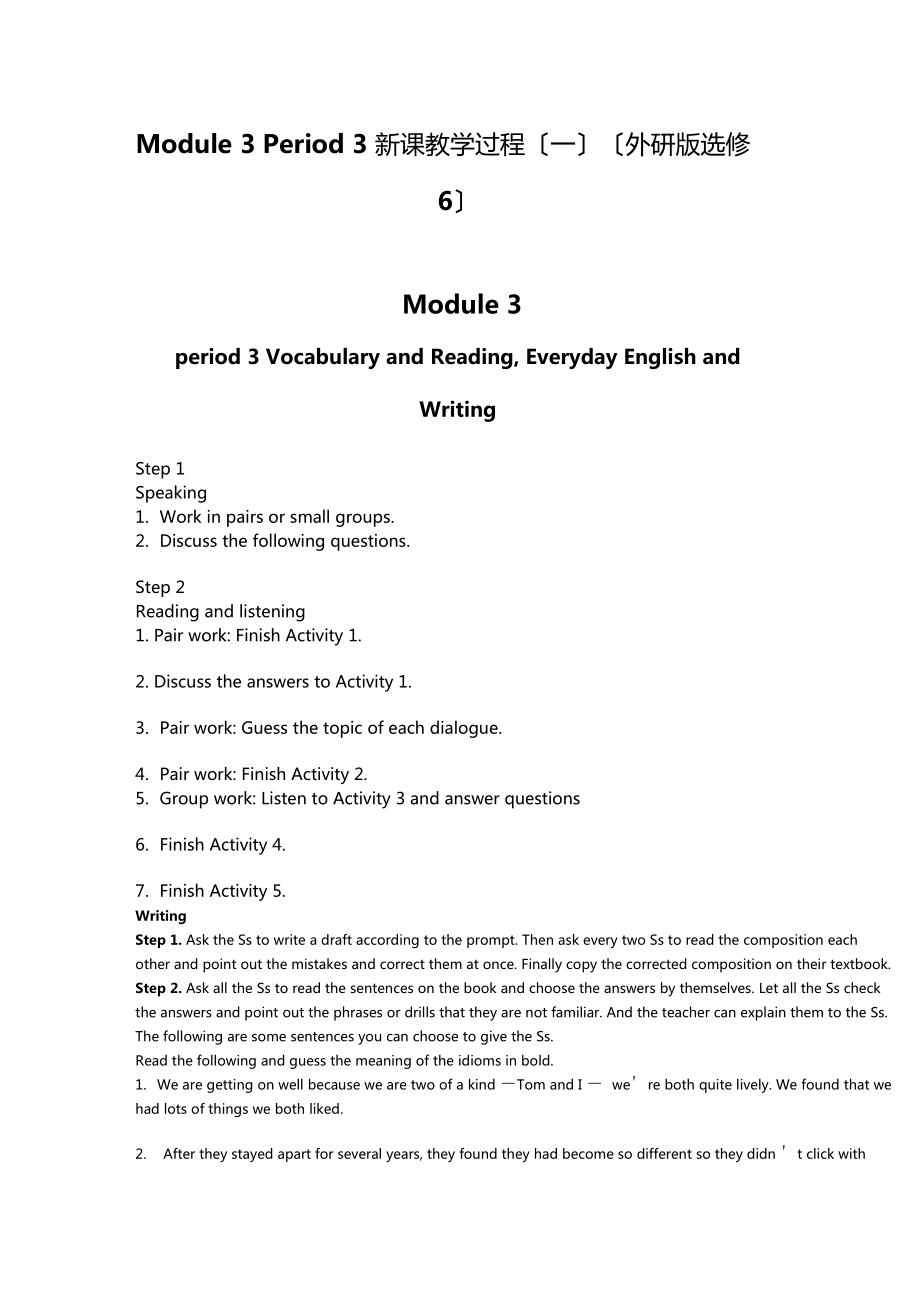《Module3InterpersonalRelationships-Period3新課教學(xué)過程一外研版選修6》由會員分享�����,可在線閱讀�����,更多相關(guān)《Module3InterpersonalRelationships-Period3新課教學(xué)過程一外研版選修6(2頁珍藏版)》請?jiān)谘b配圖網(wǎng)上搜索�����。
1�����、Module 3 Period 3 新課教學(xué)過程〔一〕〔外研版選修
6〕
Module 3
period 3 Vocabulary and Reading, Everyday English and
Writing
Step 1
Speaking
1. Work in pairs or small groups.
2. Discuss the following questions.
Step 2
Reading and listening
1. Pair work: Finish Activity 1.
2. Discuss the answers to Activi
2�����、ty 1.
3. Pair work: Guess the topic of each dialogue.
4. Pair work: Finish Activity 2.
5. Group work: Listen to Activity 3 and answer questions
6. Finish Activity 4.
7. Finish Activity 5.
Writing
Step 1. Ask the Ss to write a draft according to the prompt. Then ask every two Ss to read the co
3�����、mposition each other and point out the mistakes and correct them at once. Finally copy the corrected composition on their textbook.
Step 2. Ask all the Ss to read the sentences on the book and choose the answers by themselves. Let all the Ss check the answers and point out the phrases or drills tha
4�����、t they are not familiar. And the teacher can explain them to the Ss. The following are some sentences you can choose to give the Ss.
Read the following and guess the meaning of the idioms in bold.
1. We are getting on well because we are two of a kind -Tom and I - we' re both quite lively. We foun
5�����、d that we had lots of things we both liked.
2. After they stayed apart for several years, they found they had become so different so they didn ' t click with each other any more.
3. He is so excellent and does so well in his lessons. It ' s my guess that he will go to a good
university in the fut
6、ure.
4. The students that graduated from the same school in 1997 want t o get together. They ' d like to
see their old school and remember the days when they studied together.
Step 3.
Ask every two Ss to finish the program from1 to 5.
Ask every four Ss to talk about the two questions and exchan
7�����、ge their own opinions.
The two questions What did you learn from the experience?
Give advice on how to keep friends.
Step 4. Ask the Ss to finish the blanks in Activity1.
The teacher asks the questions in Activity2 and sum them up.
Remember to do something: you must do it.
Remember doing somet
8�����、hing: you did it before.
Regret to do something: you feel sorry for what you are going to do.
Regret doing something: you feel sorry for what you have done.
Step 5.
Ask the Ss to finish the exercises in Activity3.
The teacher let the Ss to sum them up.
Stop to do something: You stop the work y
9�����、ou have been doing in order to do it. ( “ to do
the adverbial of purpose.)
Stop doing something: You stop the work you have been doing; you no longer do what have been doing. ( “ doing 〞 is used as thetobje“ctstop 〞 .)
Forget to do something: You should do it, but you haven ' t done it.
Forget d
10�����、oing something: You have done it, but you forget about it.
Go on to do something: You finish doing what you have been doing and move on to something else.
Go on doing something: You continue doing what you have been doing.
Step 6. Ask the Ss to read the passage and then get a main idea of the pas
11�����、sage.
Step 7. Read the passage and number the sentences in Activity 2 in the order they appear.
Answers of Activity 3: e b f d g a c.
Answers of Activity 4: 3
Step 8: Ask the Ss to work in pairs and discuss the answers to the questions.
1 Did you have a close friend when you were a young child?
12�����、
What sort of things did you do together?
2 Are you still in touch with this person? If so, have you remained in touch all the time?
If not, when did you lose touch?
Did something special happen which changed your friendship?
3 How many friends do you still know from your primary school or before? Do you still get on well with them, or have you grown apart?
4 What are the most important features of a good friendship?
What are the dangers?
 Module3InterpersonalRelationships-Period3新課教學(xué)過程一外研版選修6
Module3InterpersonalRelationships-Period3新課教學(xué)過程一外研版選修6

